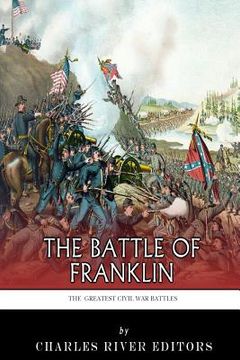Reseña del libro "The Greatest Civil War Battles: The Battle of Franklin (en Inglés)"
*Includes pictures *Includes accounts of the fighting by soldiers and generals *Includes online resources and a bibliography for further reading *Includes a table of contents "'Pickett's charge at Gettysburg' has come to be a synonym for unflinching courage in the raw. The slaughter-pen at Franklin even more deserves the gory honor." - Stanley F. Horn, The Army of Tennessee As Sherman began his infamous march to the sea, Lincoln instructed Grant to redirect General George H. Thomas' efforts back to Tennessee to protect Union supply lines and stop the offensive mounted by Confederate general John Bell Hood. Hood had broken away from Atlanta and was trying to compel Sherman to follow him, thus diverting him from his intended path of destruction. With Sherman marching east toward the sea, he directed Thomas to try to block Hood around Nashville. In late November, the Army of the Ohio, being led by Thomas' principal subordinate John Schofield, all but blindly stumbled into Hood's forces, and it was only through luck that some of them had not been bottled up before they could regroup together. Receiving word of Union troop movement in the Nashville area, General Hood sent for his generals while attempting to hold off Schofield's advance. Hood knew that if Schofield reached Thomas' position, their combined armies would number more than twice his. Though the Confederates successfully blocked Schofield's route to Nashville, the Union general managed to execute an all-night maneuver that brought him to Franklin, about 18 miles south of Nashville. On November 30, the Union army began digging in around Franklin, and that afternoon Hood ordered a frontal assault on the dug in Union army which deeply upset his own officers. Hood stressed the necessity of defeating Schofield's forces before Thomas could arrive, though some historians believe his decision to mount a frontal attack was a rash decision made out of fury at the fact Schofield had escaped his grasp. Patrick Cleburne, known as the "Stonewall of the West," was perhaps the most vocally outspoken opponent of the plan, and he suggested a plan to flank the Union position. Hood refused to consider it, and as Cleburne mounted his horse and acknowledged his duty, Cleburne rallied his men and promised Hood, "We will take the works or fall in the attempt!" In a more private remark to one of his brigadier generals, Daniel Govan, Cleburne said, "Well, Govan, if we are to die, let us die like men." After repeated frontal assaults failed to create a gap in the Union lines, Schofield withdrew his men across the river on the night of November 30, successfully escaping Hood's army. Meanwhile, Hood had inflicted nearly 8,000 casualties upon his army (men the Confederacy could scarcely afford to lose), while the Union lost about a quarter of that. Despite practically wrecking his army, which was now only about 25,000 strong, Hood marched his battered army to a position outside Nashville, Tennessee, where he took up defensive positions while awaiting reinforcements from Texas. About two weeks later, at the Battle of Nashville, Thomas effectively destroyed Hood's command, inflicting over 6,000 more Confederate casualties while losing less than half that. Civil War historian Wiley Ford noted of the campaign, "Never had there been such an overwhelming victory during the Civil War - indeed, never in American military history." Upon reaching his headquarters at Tupelo, Mississippi, General Hood requested to be relieved of command rather than be removed in disgrace. The Greatest Civil War Battles: The Battle of Franklin analyzes the events leading up to the important Union victory and the climactic fighting itself. Along with pictures of important people, places, and events, you will learn about the Battle of Franklin like never before.

